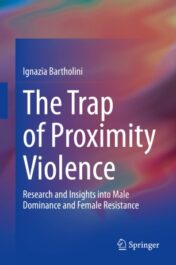This book aims at shifting the emphasis from a general vision of gender-based violence to a more opaque, yet equally destructive one, that related to “proximity violence”.
The first type of violence is exercised in multiple situations and in the generality of relationships experienced by people involving others who are both strangers to and intimate with each other. Proximity violence provides and includes a fiduciary kind of “proximity”, of “dependent intimacy”, where the trust that the victim places in the other (her tormentor) favours the exercise of violence itself, allowing it to take place, thus making it practically imperceptible when not actually normal, in extreme cases.
In turn, this confidence is comparable to “a veil of Maja” which, in conditions of vulnerability typical of victims, attenuates the consequences of the violence undergone or the omens of what becomes violent action.
The conceptual triad: proximity violence, vulnerability, resistance-resilience is explored here, in the three main chapters and in the details aimed at identifying, in the final chapter, the mutual interconnections.
This book will be of particular interest and use to undergraduate and graduate students of sociology and gender studies








